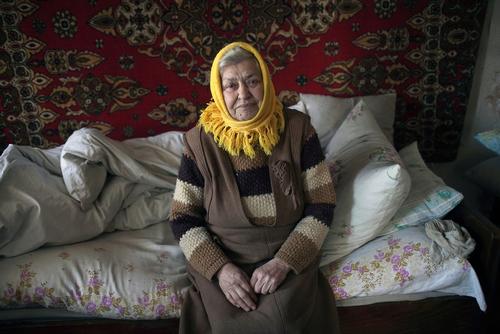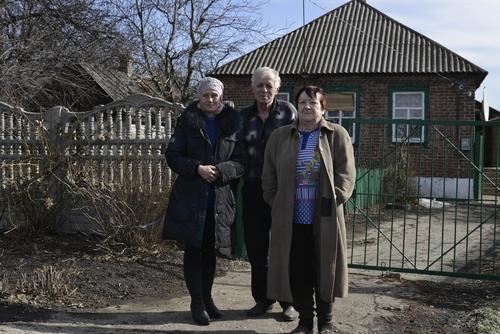One year after the conflict began in eastern Ukraine, medical needs remain urgent on both sides of the frontline, for residents and displaced people. Many health workers have left and medical supply lines have been either cut or severely disrupted, leaving thousands of people without access to adequate healthcare in remote villages. Many medical facilities have been damaged or destroyed, and there continue to be critical shortages of basic and specialised medicines.
MSF continues to expand its medical activities to meet the needs of people living in the hardest-hit areas, and to people who had to flee the conflict. MSF has offices in Kyiv, Artemivsk, Kurakhove, Donetsk, Mariupol and Lugansk and its activities are run by 69 international and 241 local staff.
Basic healthcare Since January, MSF has been running mobile clinics in Donetsk and Lugansk regions, on both sides of the frontline, to provide basic healthcare in towns and villages to residents and to displaced people living in temporary accommodation. Teams have been expanding the activities and now run mobile clinics in about 80 locations, focusing on reaching people in rural and remote areas where the needs are more acute. In Debaltsevo, which was devastated by fighting in January and February and where people live in precarious conditions, an MSF team is conducting home consultations for elderly patients who are unable to move and also equipped a van to provide medical consultations around the city. In March and April, MSF carried out 396 home visits and 1216 consultations in the mobile clinic.
Many of the people who have remained in the most affected areas are the most vulnerable in the community – the elderly, disabled and sick – who did not have the means to leave. MSF’s doctors mostly see patients with chronic diseases, as well as respiratory infections because so many homes have had the windows blown out and people are living in poorly heated shelters. In two facilities for the elderly and disable in the south of Lugansk region, MSF also provides physiotherapy care and training as well as assistance for the provision and adaptation of prostheses in order to improve patient mobility.
Mental health programme
MSF is also expanding its mental health programme to reach more people affected by the conflict, patients in social facilities, displaced people, as well as medical staff. More than 2,400 individual consultations have been conducted from May 2014 to May 2015. Many patients are traumatised by the events they experienced and can experience insomnia or anxiety. Some have directly witnessed bombings and lost their loved ones, while others have been separated from their families when they fled. MSF provides counselling to the patients to try to relieve the most acute symptoms they experience. MSF psychologists have also been running a training programme for local psychologists, social workers and medical staff working throughout the affected region to help improve their skills and avoid burn-out. Since August, they have carried out more than 540 training sessions, on topics such as psychological first aid, stress management and dealing with aggressive patients.
Medical supplies
With medical supply lines in the east of the country severely disrupted or cut entirely since last summer, and health facilities located in rebel-held areas not included in the 2015 Ukrainian government health budget, there has been a critical shortage of medicines in the area. Since the beginning of the conflict, MSF has supplied more than 130 facilities, hospitals, ambulatories and social facilities, with medicines and medical materials and equipment.
Multi-drug-resistant tuberculosis programme in penitentiary system
MSF has been running a multi-drug-resistant tuberculosis programme in Ukraine since 2011, and currently has 170 patients under treatment in five pre-detention centres and prisons in Mariupol, Artemovsk, Dnepropetrovsk, Dzhanivka and Donetsk. The team provides all the necessary drugs to treat the disease and to help patients deal with the side effects of the treatment. When the conflict started in eastern Ukraine, keeping the TB programme running became a real challenge, leading MSF to eventually stop working in the detention centres, as heavy shelling made it too dangerous for the teams to reach them. However, even though the team could not get there, MSF managed to make sure that the drugs were still available – as they have been, without rupture, throughout the whole conflict.
MSF has now resumed its regular presence in the facilities and is helping to fill some of the gaps in health staff. Many of the patients who stopped their treatment have now restarted, and data shows good results in terms of their adherence to treatment. MSF is also trying to help control the spread of the disease within the penitentiary system by providing support with early diagnosis of the disease and improving infection control mechanisms.
Since May 2014:
Provided medical supplies for treating 20,750 war-wounded patients
Provided medicines to treat 32,700 patients with chronic diseases
Provided supplies to help doctors conduct 53,200 basic healthcare consultations
Provided supplies to support safe delivery for 3,300 pregnant women
Conducted 2,405 individual counselling sessions
Conducted 541 psychological training sessions
MSF is currently supporting 170 drug-resistant tuberculosis patients in five penitentiary facilities





